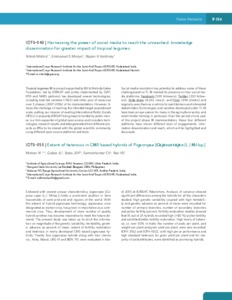Extent of heterosis in CMS based hybrids of Pigeonpea (Cajanus cajan (L.) Millsp.)
Abstract
Endowed with several unique characteristics, pigeonpea (Cajanus cajan (L.) Millsp.) holds a prominent position in farm households of semi-arid and arid regions of the world. With the advent of hybrid pigeonpea technology, pigeonpea, once designated as orphan crop, has grown in importance as a commercial crop. Thus, development of more number of quality hybrid varieties has become imperative to meet the future demand. The present study was taken up to elicit the information on magnitude of the genetic variability, heritability, genetic advance as percent of mean, extent of fertility restoration and heterosis in newly developed CMS based pigeonpea hybrids. Twenty four pigeonpea hybrids along with four checks viz., Asha, Maruti, LRG 41 and BDN 711, were evaluated in kharif 2015 at ICRISAT, Patancheru. Analysis of variance showed significant differences among the hybrids for all the characters studied. High genetic variability coupled with high heritability and genetic advance as percent of mean were recorded for number of primary branches, number of secondary branches and pollen fertility percent. Fertility restoration studies showed that 15 out of 24 hybrids recorded high (>80 %) pollen fertility and exhibited better fertility restoration. High levels of heterosis i.e. over 50% in traits like number of pods per plant, pod weight per plant and grain yield per plant. were also recorded. ICPH 3762 and ICPH 4502, with high per se performance and high standard heterosis for grain yield per plant and for majority of yield attributes, were identified as promising hybrids

